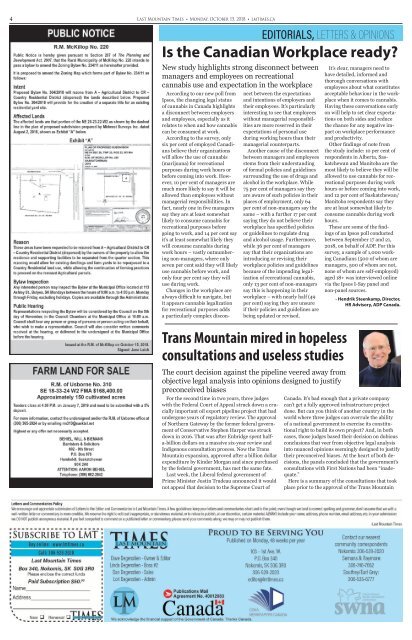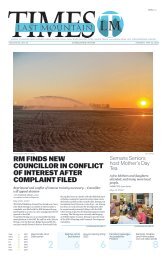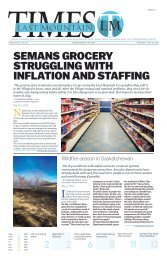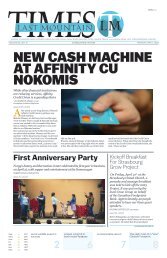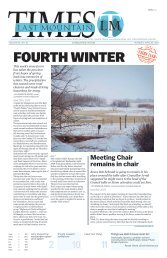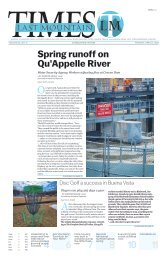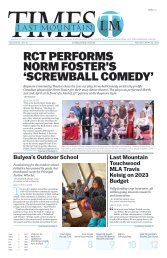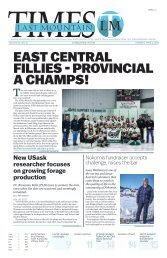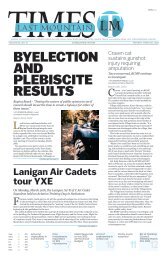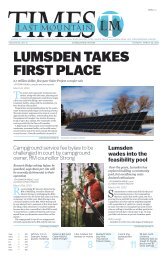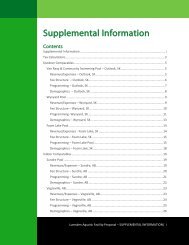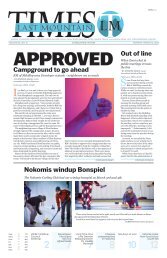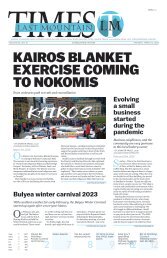LMT October 15th 2018
Create successful ePaper yourself
Turn your PDF publications into a flip-book with our unique Google optimized e-Paper software.
4 Last Mountain Times • Monday, <strong>October</strong> 15, <strong>2018</strong> • lmtimes.ca<br />
EDITORIALS, LETTERS & OPINIONS<br />
Is the Canadian Workplace ready?<br />
New study highlights strong disconnect between<br />
managers and employees on recreational<br />
cannabis use and expectation in the workplace<br />
Trans Mountain mired in hopeless<br />
consultations and useless studies<br />
The court decision against the pipeline veered away from<br />
objective legal analysis into opinions designed to justify<br />
preconceived biases<br />
For the second time in two years, three judges<br />
with the Federal Court of Appeal struck down a crucially<br />
important oil export pipeline project that had<br />
undergone years of regulatory review. The approval<br />
of Northern Gateway by the former federal government<br />
of Conservative Stephen Harper was struck<br />
down in 2016. That was after Enbridge spent halfa-billion<br />
dollars on a massive six-year review and<br />
Indigenous consultation process. Now the Trans<br />
Mountain expansion, approved after a billion dollar<br />
expenditure by Kinder Morgan and since purchased<br />
by the federal government, has met the same fate.<br />
Last week, the Liberal federal government of<br />
Prime Minister Justin Trudeau announced it would<br />
not appeal that decision to the Supreme Court of<br />
According to our new poll from<br />
Ipsos, the changing legal status<br />
of cannabis in Canada highlights<br />
a disconnect between employers<br />
and employees, especially as it<br />
relates to when and how cannabis<br />
can be consumed at work.<br />
According to the survey, only<br />
six per cent of employed Canadians<br />
believe their organizations<br />
will allow the use of cannabis<br />
(marijuana) for recreational<br />
purposes during work hours or<br />
before coming into work. However,<br />
10 per cent of managers are<br />
much more likely to say it will be<br />
allowed than employees without<br />
managerial responsibilities. In<br />
fact, nearly one in five managers<br />
say they are at least somewhat<br />
likely to consume cannabis for<br />
recreational purposes before<br />
going to work, and 14 per cent say<br />
it’s at least somewhat likely they<br />
will consume cannabis during<br />
work hours – vastly outnumbering<br />
non-managers, where only<br />
seven per cent said they will likely<br />
use cannabis before work, and<br />
only four per cent say they will<br />
use during work.<br />
Changes in the workplace are<br />
always difficult to navigate, but<br />
it appears cannabis legalization<br />
for recreational purposes adds<br />
a particularly complex disconnect<br />
between the expectations<br />
and intentions of employers and<br />
their employees. It’s particularly<br />
interesting to see that employees<br />
without managerial responsibilities<br />
are more reserved in their<br />
expectations of personal use<br />
during working hours than their<br />
managerial counterparts.<br />
Another cause of the disconnect<br />
between managers and employees<br />
stems from their understanding<br />
of formal policies and guidelines<br />
surrounding the use of drugs and<br />
alcohol in the workplace. While<br />
75 per cent of managers say they<br />
are aware of such policies in their<br />
places of employment, only 64<br />
per cent of non-managers say the<br />
same – with a further 17 per cent<br />
saying they do not believe their<br />
workplace has specified policies<br />
or guidelines to regulate drug<br />
and alcohol usage. Furthermore,<br />
while 36 per cent of managers<br />
say that their organizations are<br />
introducing or revising their<br />
workplace policies and guidelines<br />
because of the impending legalization<br />
of recreational cannabis,<br />
only 13 per cent of non-managers<br />
say this is happening in their<br />
workplace – with nearly half (49<br />
per cent) saying they are unsure<br />
if their policies and guidelines are<br />
being updated or revised.<br />
It’s clear, managers need to<br />
have detailed, informed and<br />
thorough conversations with<br />
employees about what constitutes<br />
acceptable behaviour in the workplace<br />
when it comes to cannabis.<br />
Having these conversations early<br />
on will help to set clear expectations<br />
on both sides and reduce<br />
the chance for any negative impact<br />
on workplace performance<br />
and productivity.<br />
Other findings of note from<br />
the study include: 10 per cent of<br />
respondents in Alberta, Saskatchewan<br />
and Manitoba are the<br />
most likely to believe they will be<br />
allowed to use cannabis for recreational<br />
purposes during work<br />
hours or before coming into work,<br />
and 12 per cent of Saskatchewan/<br />
Manitoba respondents say they<br />
are at least somewhat likely to<br />
consume cannabis during work<br />
hours.<br />
These are some of the findings<br />
of an Ipsos poll conducted<br />
between September 17 and 21,<br />
<strong>2018</strong>, on behalf of ADP. For this<br />
survey, a sample of 1,000 working<br />
Canadians (500 of whom are<br />
managers, 500 of whom are not,<br />
none of whom are self-employed)<br />
aged 18+ was interviewed online<br />
via the Ipsos I-Say panel and<br />
non-panel sources.<br />
- Hendrik Steenkamp, Director,<br />
HR Advisory, ADP Canada.<br />
Canada. It’s bad enough that a private company<br />
can’t get a fully approved infrastructure project<br />
done. But can you think of another country in the<br />
world where three judges can overrule the ability<br />
of a national government to exercise its constitutional<br />
right to build its own project? And, in both<br />
cases, those judges based their decision on dubious<br />
conclusions that veer from objective legal analysis<br />
into nuanced opinions seemingly designed to justify<br />
their preconceived biases. At the heart of both decisions,<br />
the panels concluded that the government’s<br />
consultations with First Nations had been “inadequate.”<br />
Here is a summary of the consultations that took<br />
place prior to the approval of the Trans Mountain


